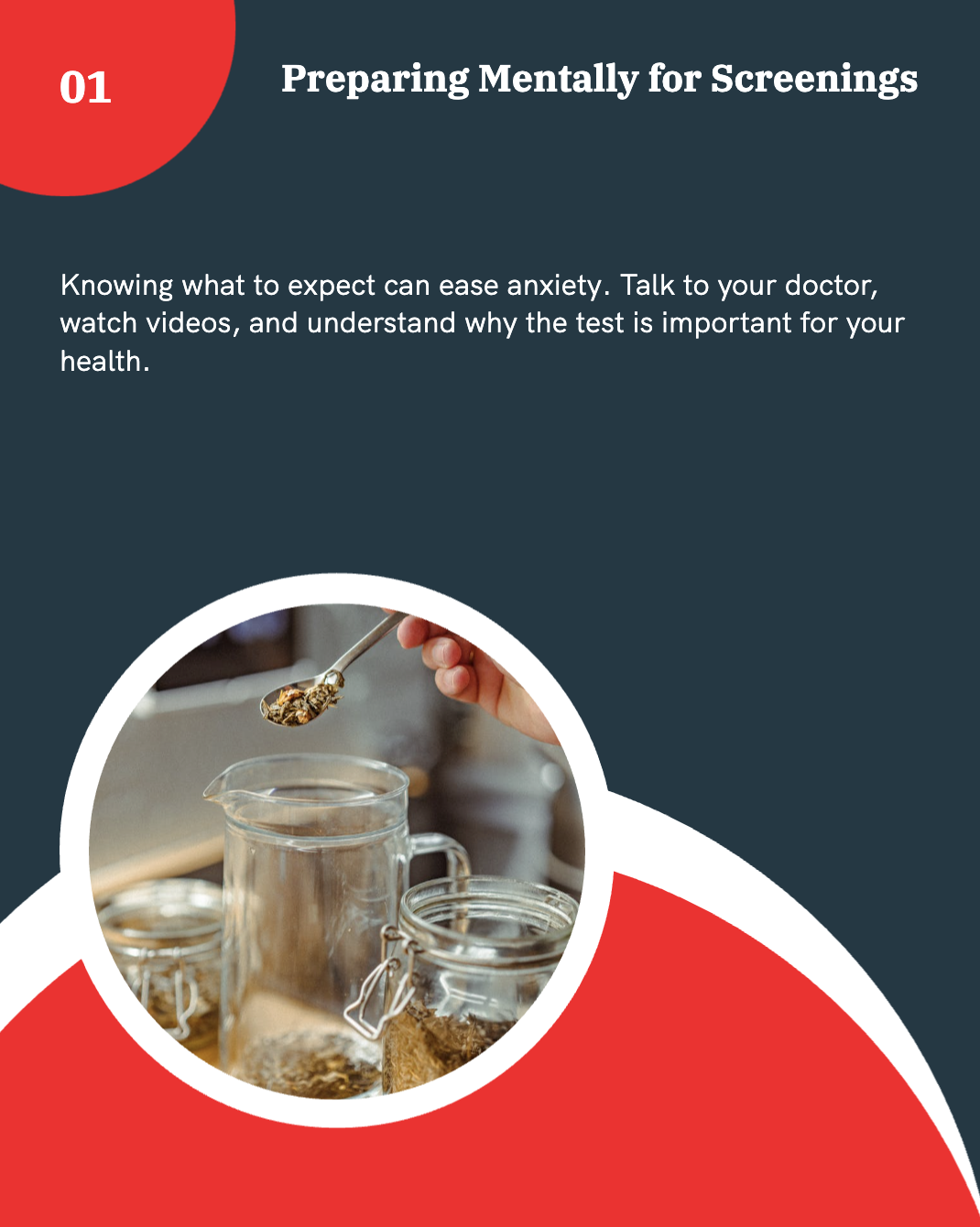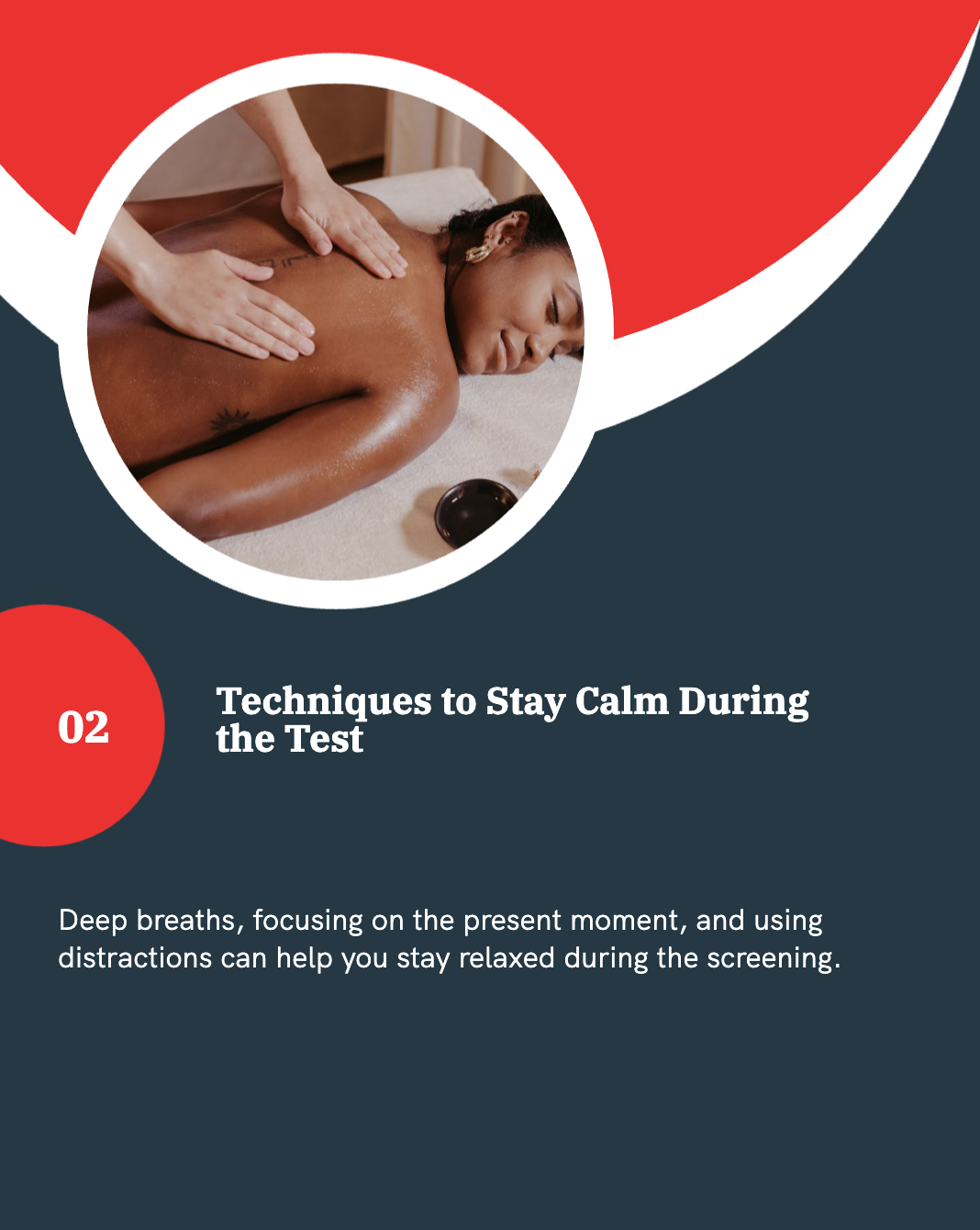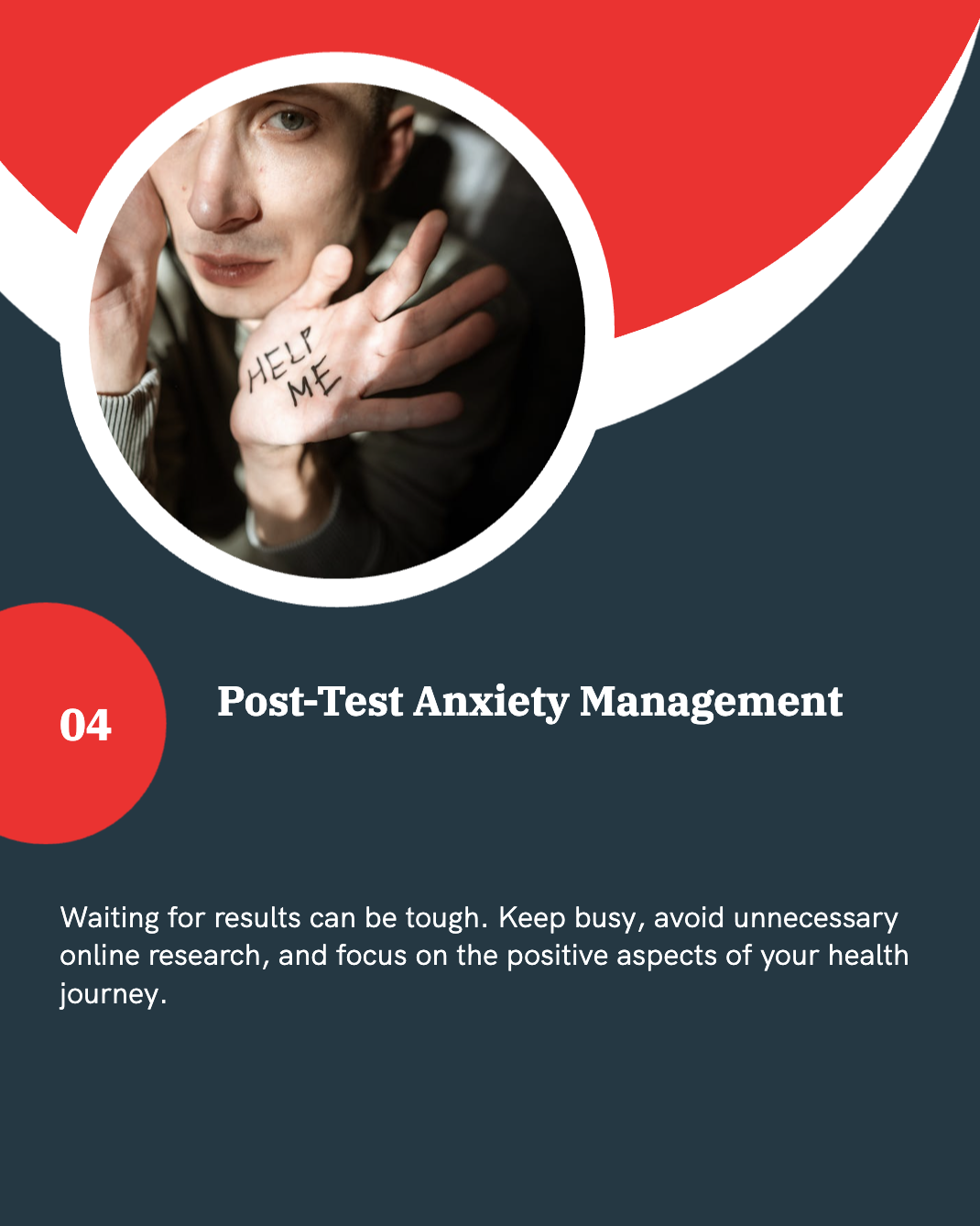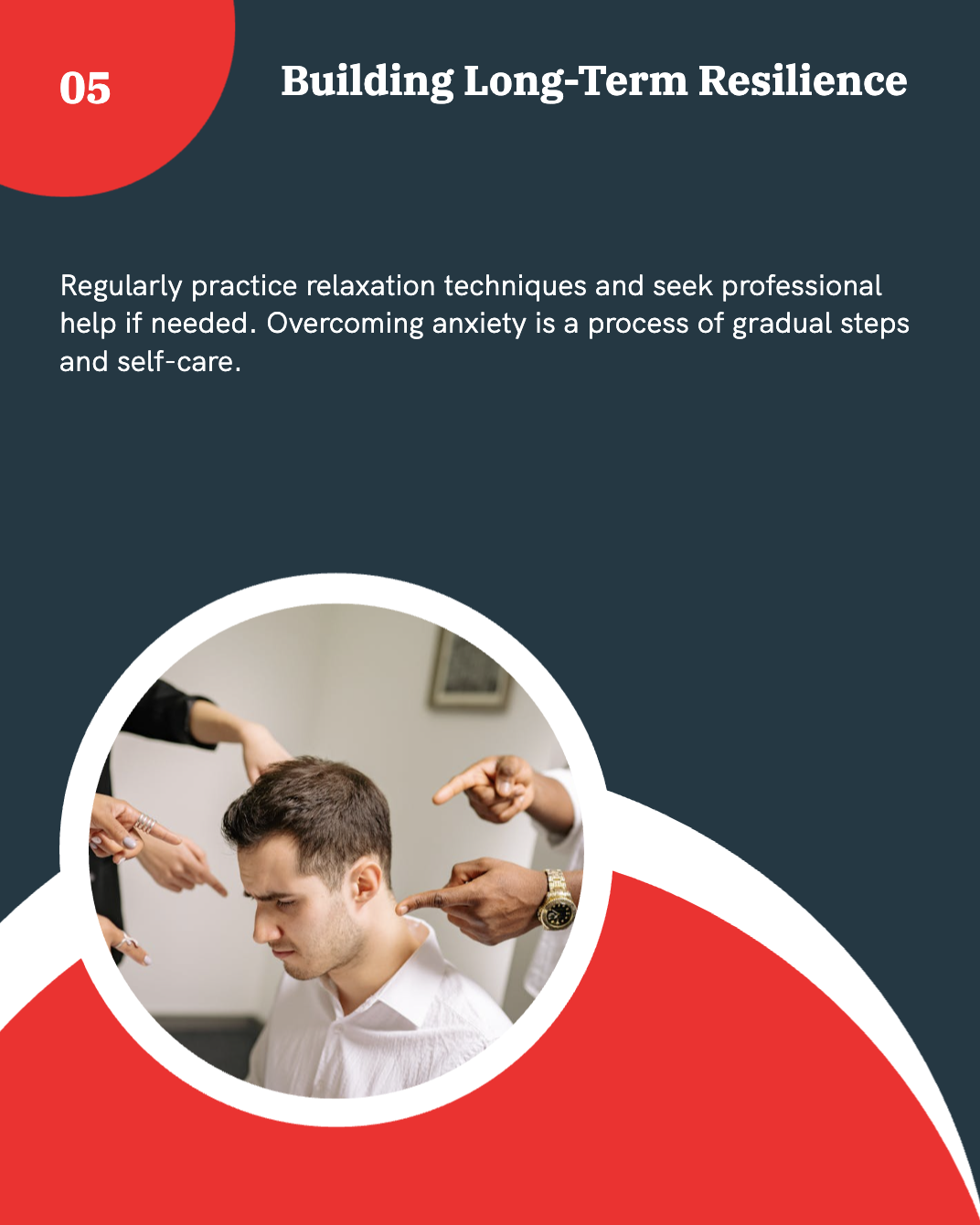MANAGING ANXIETY DURING HEALTH SCREENINGS OR TESTS
HOME
BLOG
MANAGING ANXIETY DURING HEALTH SCREENINGS OR TESTS
Health screenings or tests are essential for maintaining overall well-being, but they can be a source of significant anxiety for many. The thought of needles, test results, or even just being in a medical environment can trigger stress and fear. Here, we’ll explore actionable tips and strategies to help manage anxiety during health screenings or tests, so you can approach these situations with confidence and calm.
WHY DO HEALTH SCREENINGS CAUSE ANXIETY?
Health screenings often bring up feelings of vulnerability and uncertainty. Understanding why you might feel anxious can help you address those emotions effectively.
Common Triggers of Anxiety During Screenings
- Fear of needles or pain: Many people have a phobia of needles or are worried about experiencing pain during procedures.
- Uncertainty about results: The "what if" scenario about test outcomes can cause stress.
- Past negative experiences: A prior unpleasant medical procedure can leave lingering anxiety.
- Loss of control: Being in an unfamiliar setting where someone else is in charge can heighten stress.
Physical Symptoms of Anxiety
- Rapid heartbeat or palpitations
- Sweaty palms or cold hands
- Shortness of breath
- Nausea or stomach discomfort
- Feeling faint or dizzy

PREPARING MENTALLY FOR HEALTH SCREENINGS
IMAGE
Preparation is key to reducing anxiety. Being proactive about managing stress before your appointment can make a significant difference.
Educate Yourself About the Process
- Ask your healthcare provider what to expect during the screening. Knowledge helps demystify the procedure.
- Watch videos or read reliable materials about the test.
- Understand why the test is necessary and how it benefits your health.
Practice Positive Self-Talk
- Remind yourself, “This is a step toward better health.”
- Focus on the fact that health screenings are preventative and designed to keep you safe.

TECHNIQUES TO STAY CALM DURING THE TEST
Once you’re at the appointment, try these techniques to stay relaxed and composed.
Breathing Exercises
Deep breathing is a powerful tool for calming the mind and body.
- Inhale slowly through your nose for a count of four.
- Hold your breath for four counts.
- Exhale slowly through your mouth for a count of six.
- Repeat until you feel more relaxed.
Mindfulness and Visualization
- Mindfulness: Focus on the present moment rather than worrying about the outcome.
- Visualization: Picture a peaceful scene, such as a beach or forest, to distract your mind.
Use Distractions
- Listen to calming music or a podcast.
- Bring a stress ball or fidget device to keep your hands occupied.
- Focus on an object in the room, like a picture or a clock, and observe its details.

COMMUNICATING YOUR ANXIETY
You don’t have to handle your anxiety alone. Letting others know how you feel can help them support you better.
Talk to Your Healthcare Provider
- Let your doctor or nurse know about your anxiety ahead of time.
- Ask if they can explain each step of the process to help you feel more in control.
Bring a Support Person
- Having a trusted friend or family member with you can provide comfort.
- Their presence can be a calming distraction and a source of encouragement.

POST-TEST ANXIETY MANAGEMENT
Anxiety doesn’t always end after the test. Waiting for results can be equally stressful. Here’s how to cope during this period.
Stay Busy
- Engage in activities you enjoy, like reading, exercising, or spending time with loved ones.
- Keeping your mind occupied reduces the opportunity to dwell on negative thoughts.
Limit Online Research
- Avoid looking up symptoms or potential results online, as this often increases worry.
- Trust your healthcare provider to deliver accurate and relevant information.
Practice Gratitude
- Focus on the positive aspects of your health journey.
- Write down three things you’re grateful for each day to shift your perspective.

BUILDING LONG-TERM RESILIENCE
Overcoming anxiety isn’t just about the moment—it’s about developing skills to handle future challenges.
Gradual Exposure
- If specific aspects of screenings make you nervous (like needles), consider gradual exposure to reduce fear over time.
- Talk to a therapist about strategies for overcoming medical phobias.
Adopt Relaxation Techniques in Daily Life
- Regular meditation, yoga, or tai chi can lower overall anxiety levels.
- Build these habits into your routine for lasting benefits.
Seek Professional Help
- If anxiety becomes overwhelming, talk to a therapist or counselor specializing in medical-related fears.
- Cognitive Behavioral Therapy (CBT) is particularly effective for addressing anxiety triggers.
FAQs
- What should I do if I feel faint during a screening?
If you start to feel faint, let the medical staff know immediately. Practice deep breathing, and if possible, sit or lie down with your legs elevated to improve blood flow.
- How can I calm my child’s anxiety about health tests?
Explain the procedure in simple terms they can understand. Use distractions like toys or videos, and offer plenty of reassurance and praise for their bravery.
- Are there medications that can help with anxiety during tests?
Yes, for severe anxiety, your doctor may prescribe a mild sedative or anti-anxiety medication to help you stay calm.
- Can meditation apps help reduce test anxiety?
Absolutely! Apps like Calm, Headspace, or Insight Timer offer guided meditations and breathing exercises designed for stress management.
- How do I stop overthinking about test results?
Focus on what you can control, such as maintaining a healthy lifestyle. Remind yourself that worrying won’t change the outcome and practice mindfulness to stay in the present moment.
Managing anxiety during health screenings or tests is achievable with preparation, communication, and self-care strategies. By taking proactive steps to address your fears, you can transform these experiences into opportunities for growth and empowerment. Remember, every screening is a step toward better health and a brighter future.
 08.01.2025
08.01.2025





 08.01.2025
08.01.2025